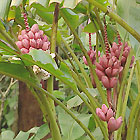Red Banana
The ornamental red banana has interesting flowers and foliage, and the colourful bananas produce lots of seeds, unlike most edible bananas which are sterile.
Plant details
Common name: Red banana, self-peeling banana
Botanic name: Musa velutina
Description
A dwarf species of ornamental banana growing to about 2m (6′) tall. The large leaves are waxy with a pinkish midrib. The plant produces yellow flowers with red modified leaves or bracts, followed by velvety red bananas. When the fruit is ripe the skins come away from the bananas, hence the common name of self-peeling banana.
Best climate
Although ornamental bananas are well suited to a tropical or subtropical climate, there are restrictions in some states due to concerns over the spread of banana diseases. See ‘Important Information’ below.
Best look
Tropical-style gardens Pots or tubs Indoor plant
Good points
Attractive flowers, fruit and foliage Easy to grow in warm, frost-free climates Easy to propagate
Downside
May be difficult to find Not suitable for cooler areas. For a banana look-alike away from the coast, try giant strelitzia (Strelitzia nicolai).
Care
Bananas like rich, well-drained soil with added organic material (compost and manures). They need a position in full sun with protection from frost and strong winds. Encourage plenty of leafy growth with good watering and mulching. Feed with a complete fertiliser during the growth periods (spring to autumn). Remove dead leaves to keep the plant tidy. Also, cut down stems that are dying back after fruiting. Propagate from ripe seed or by dividing the clump.
Getting started
Other ornamental bananas include Musa ornata which has attractive purple bracts, and M. zebrina with its handsome striped and folded leaves. M. acuminata is a dwarf banana known for its fragrant, edible fruit. Eneste ventricosum, the Abyssinian banana, has arching 6m long leaves with a red midrib.
Ornamental bananas can be ordered through your local nursery, or purchased from growers offering ornamental varieties, such as:
Fruit Spirit Botanical Garden
Lot 69, Dunoon Road
Dorroughby, NSW, 2480
Phone: (02) 6689 5192
or visit the website at www.fruitspirit.com.au
Important information
Restrictions exist on the growing and transport of banana plants and propagation material in Queensland, parts of northern NSW and the Northern Territory to protect commercial banana plantations from disease. These restrictions relate to both Musa species and Ensete species. In Western Australia normal restrictions apply to the importation of plant material from other parts of Australia.
QLD
Although ornamental bananas are well suited to a tropical or subtropical climate, these ornamental plants can not be grown in Queensland due to concerns over the spread of banana diseases. There are also concerns that the plants can become weedy. They are viewed as pest plants and can not be grown. Any existing plants should also be removed. Individuals or companies growing ornamental bananas can face hefty fines.
For more information contact the Queensland Department of Primary Industries on 13 25 23.
NSW
Quarantine legislation affects the movement of banana propagation material (except tissue culture) in designated local government areas on the North Coast of NSW. These restrictions relate to the control of bunchy top and banana aphid. Affected areas are those where bananas are grown commercially and include the local government areas of Ballina, Bellingen, Byron, Casino, Coffs Harbour, Copmanhurst, Grafton, Greater Taree, Hastings, Kempsey, Kyogle, Maclean, Nambucca, Nymboida, Richmond River, Tweed, Ulmarra.
For more information contact NSW Agriculture on (02) 6391 3100 or your local office.
NT
No banana plants can be brought into the NT except as tissue culture stock or seed. At present there is no restriction on growing ornamental bananas from stock already in NT.
For more information contact Primary Industry and Fisheries on (08) 8999 2311.
WA
No specific legislation applies to the growing of ornamental bananas in Western Australia but there are restrictions on the entry of many plants into WA from other states without quarantine certification.
For more information contact Agriculture WA on (08) 9368 3333 or the home garden advisory service on 1902 292 555.



